HRM Report: Evaluating HRM Strategies and Systems at Unilever
VerifiedAdded on 2023/01/13
|12
|3848
|80
Report
AI Summary
This report provides a comprehensive analysis of Human Resource Management (HRM) practices, specifically focusing on Unilever. It begins with an introduction to HRM, emphasizing its strategic importance in achieving competitive advantages. The report then delves into the effectiveness of recruitment and selection strategies, outlining the processes involved, including need identification, job description preparation, talent search, screening, interviewing, and evaluation. It also examines the legal considerations in these processes. The report further explores employee development, discussing best practices such as professional training, coaching, mentoring, and cross-departmental training, with a recommendation for Unilever's talent management approach. Finally, it offers a critical analysis of HR systems and procedures, drawing conclusions based on the findings and referencing relevant academic sources.
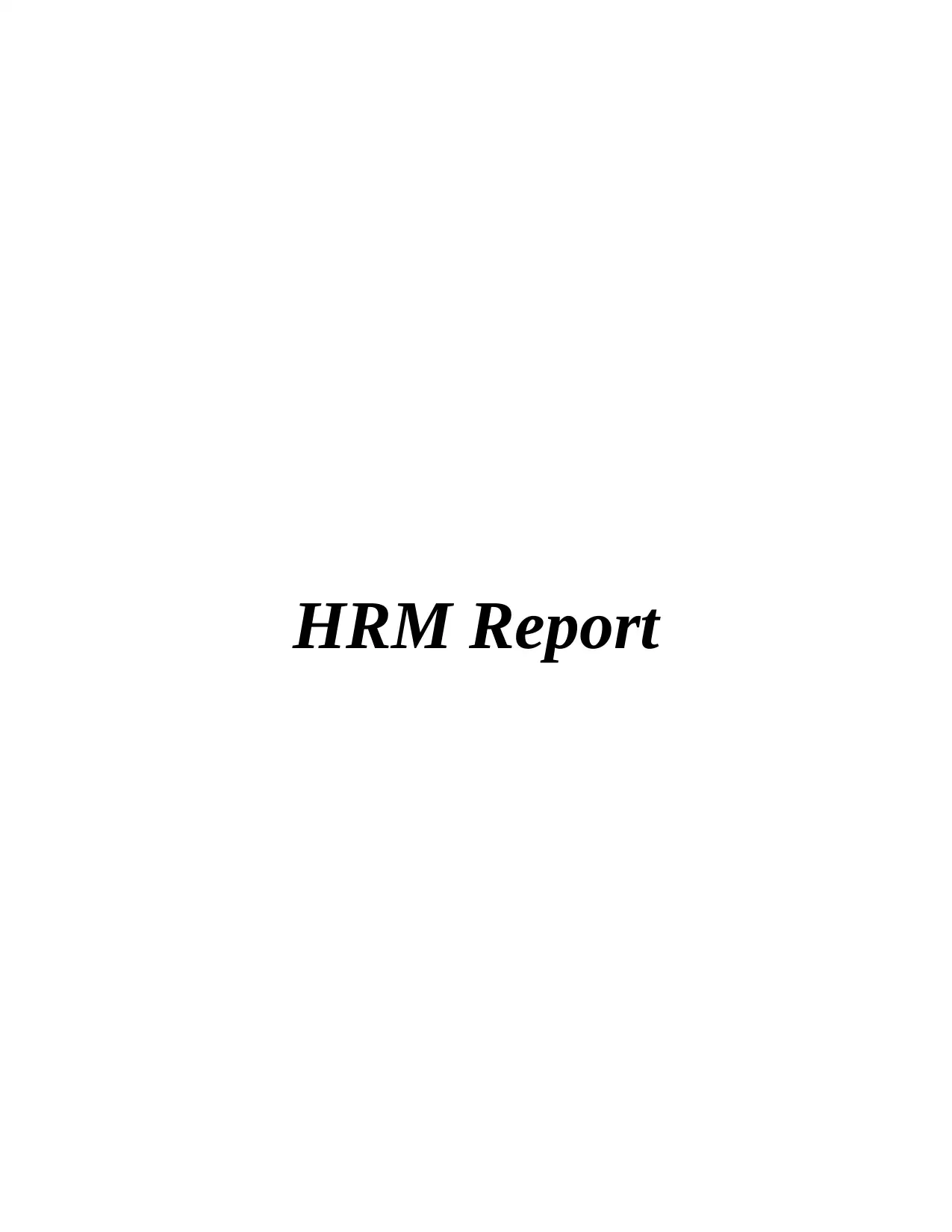
HRM Report
Paraphrase This Document
Need a fresh take? Get an instant paraphrase of this document with our AI Paraphraser
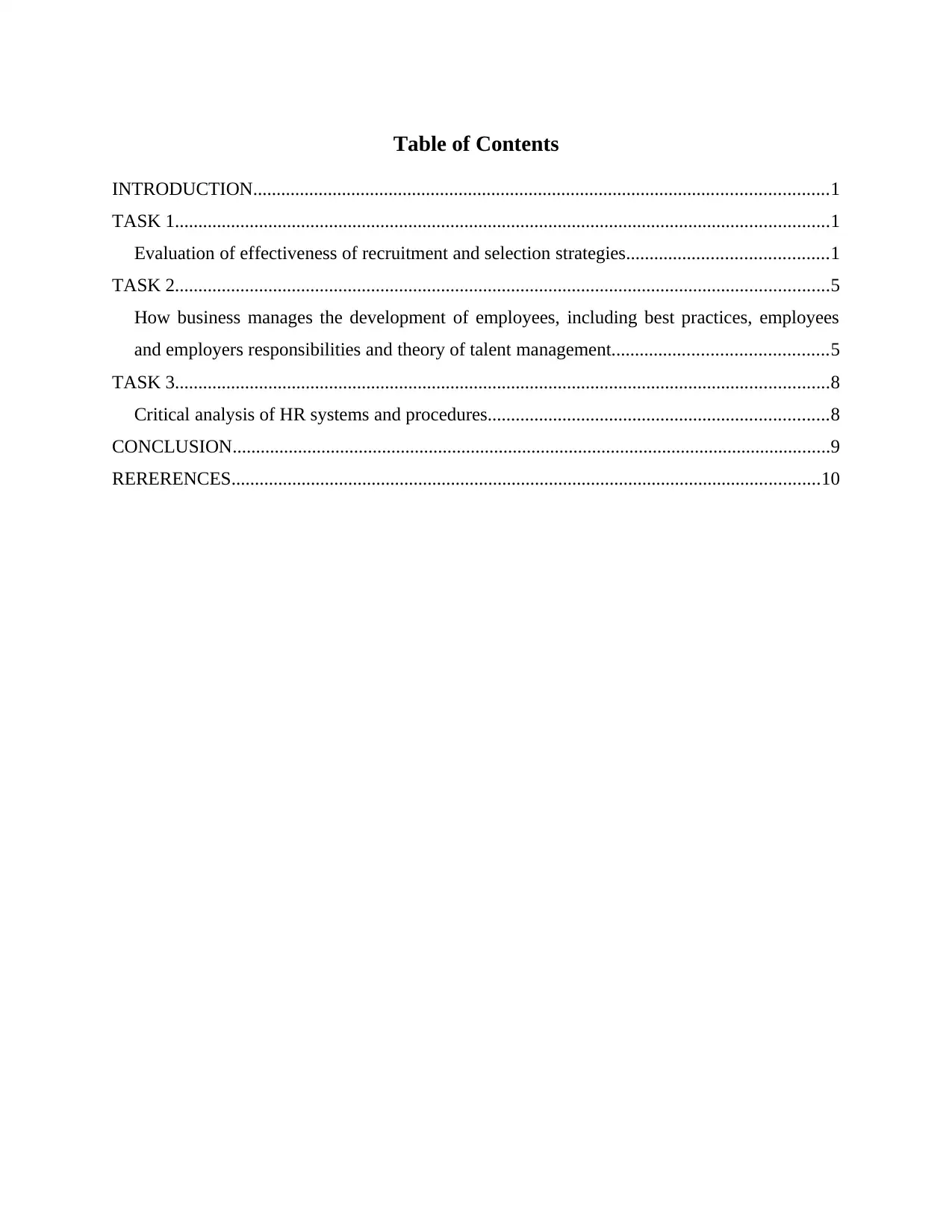
Table of Contents
INTRODUCTION...........................................................................................................................1
TASK 1............................................................................................................................................1
Evaluation of effectiveness of recruitment and selection strategies...........................................1
TASK 2............................................................................................................................................5
How business manages the development of employees, including best practices, employees
and employers responsibilities and theory of talent management..............................................5
TASK 3............................................................................................................................................8
Critical analysis of HR systems and procedures.........................................................................8
CONCLUSION................................................................................................................................9
RERERENCES..............................................................................................................................10
INTRODUCTION...........................................................................................................................1
TASK 1............................................................................................................................................1
Evaluation of effectiveness of recruitment and selection strategies...........................................1
TASK 2............................................................................................................................................5
How business manages the development of employees, including best practices, employees
and employers responsibilities and theory of talent management..............................................5
TASK 3............................................................................................................................................8
Critical analysis of HR systems and procedures.........................................................................8
CONCLUSION................................................................................................................................9
RERERENCES..............................................................................................................................10
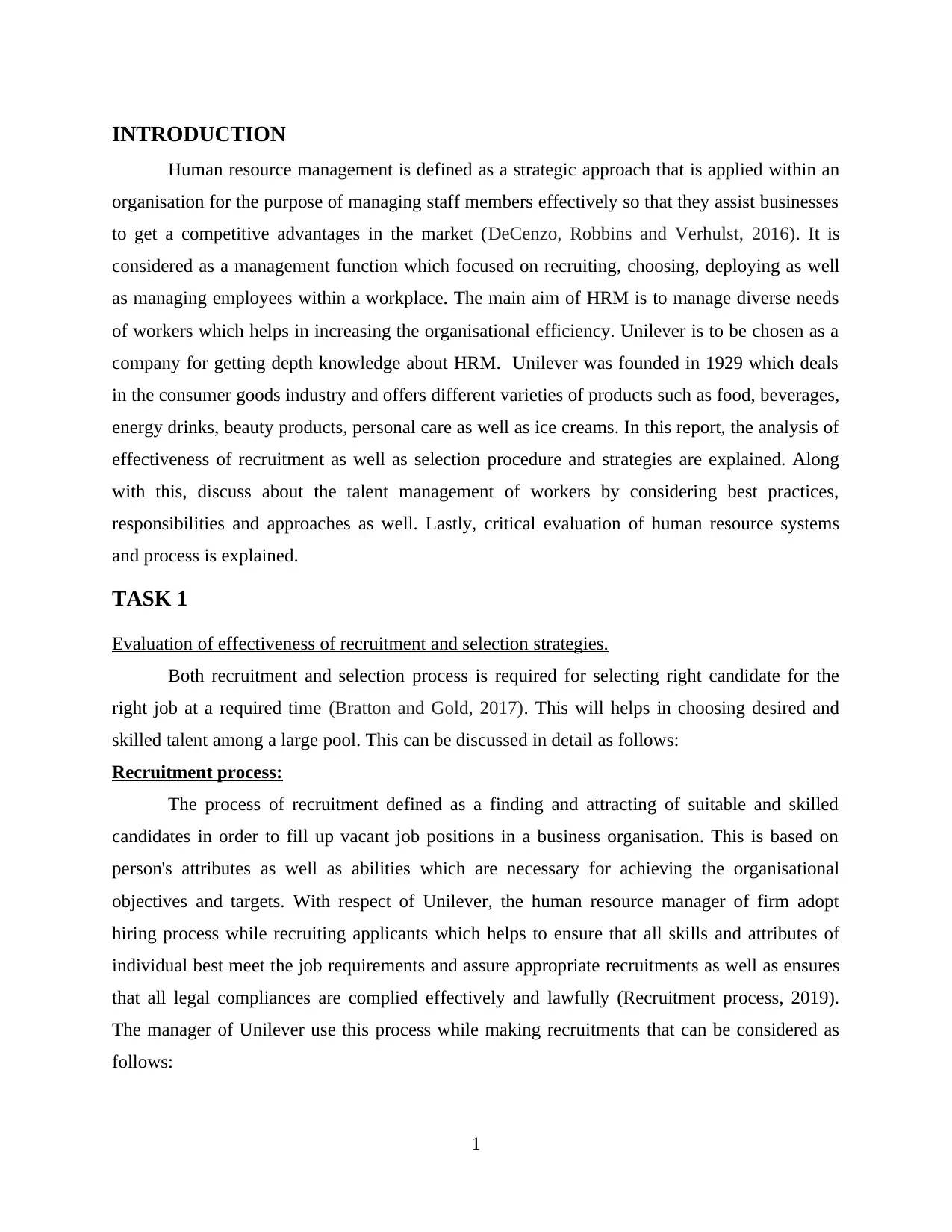
INTRODUCTION
Human resource management is defined as a strategic approach that is applied within an
organisation for the purpose of managing staff members effectively so that they assist businesses
to get a competitive advantages in the market (DeCenzo, Robbins and Verhulst, 2016). It is
considered as a management function which focused on recruiting, choosing, deploying as well
as managing employees within a workplace. The main aim of HRM is to manage diverse needs
of workers which helps in increasing the organisational efficiency. Unilever is to be chosen as a
company for getting depth knowledge about HRM. Unilever was founded in 1929 which deals
in the consumer goods industry and offers different varieties of products such as food, beverages,
energy drinks, beauty products, personal care as well as ice creams. In this report, the analysis of
effectiveness of recruitment as well as selection procedure and strategies are explained. Along
with this, discuss about the talent management of workers by considering best practices,
responsibilities and approaches as well. Lastly, critical evaluation of human resource systems
and process is explained.
TASK 1
Evaluation of effectiveness of recruitment and selection strategies.
Both recruitment and selection process is required for selecting right candidate for the
right job at a required time (Bratton and Gold, 2017). This will helps in choosing desired and
skilled talent among a large pool. This can be discussed in detail as follows:
Recruitment process:
The process of recruitment defined as a finding and attracting of suitable and skilled
candidates in order to fill up vacant job positions in a business organisation. This is based on
person's attributes as well as abilities which are necessary for achieving the organisational
objectives and targets. With respect of Unilever, the human resource manager of firm adopt
hiring process while recruiting applicants which helps to ensure that all skills and attributes of
individual best meet the job requirements and assure appropriate recruitments as well as ensures
that all legal compliances are complied effectively and lawfully (Recruitment process, 2019).
The manager of Unilever use this process while making recruitments that can be considered as
follows:
1
Human resource management is defined as a strategic approach that is applied within an
organisation for the purpose of managing staff members effectively so that they assist businesses
to get a competitive advantages in the market (DeCenzo, Robbins and Verhulst, 2016). It is
considered as a management function which focused on recruiting, choosing, deploying as well
as managing employees within a workplace. The main aim of HRM is to manage diverse needs
of workers which helps in increasing the organisational efficiency. Unilever is to be chosen as a
company for getting depth knowledge about HRM. Unilever was founded in 1929 which deals
in the consumer goods industry and offers different varieties of products such as food, beverages,
energy drinks, beauty products, personal care as well as ice creams. In this report, the analysis of
effectiveness of recruitment as well as selection procedure and strategies are explained. Along
with this, discuss about the talent management of workers by considering best practices,
responsibilities and approaches as well. Lastly, critical evaluation of human resource systems
and process is explained.
TASK 1
Evaluation of effectiveness of recruitment and selection strategies.
Both recruitment and selection process is required for selecting right candidate for the
right job at a required time (Bratton and Gold, 2017). This will helps in choosing desired and
skilled talent among a large pool. This can be discussed in detail as follows:
Recruitment process:
The process of recruitment defined as a finding and attracting of suitable and skilled
candidates in order to fill up vacant job positions in a business organisation. This is based on
person's attributes as well as abilities which are necessary for achieving the organisational
objectives and targets. With respect of Unilever, the human resource manager of firm adopt
hiring process while recruiting applicants which helps to ensure that all skills and attributes of
individual best meet the job requirements and assure appropriate recruitments as well as ensures
that all legal compliances are complied effectively and lawfully (Recruitment process, 2019).
The manager of Unilever use this process while making recruitments that can be considered as
follows:
1
⊘ This is a preview!⊘
Do you want full access?
Subscribe today to unlock all pages.

Trusted by 1+ million students worldwide
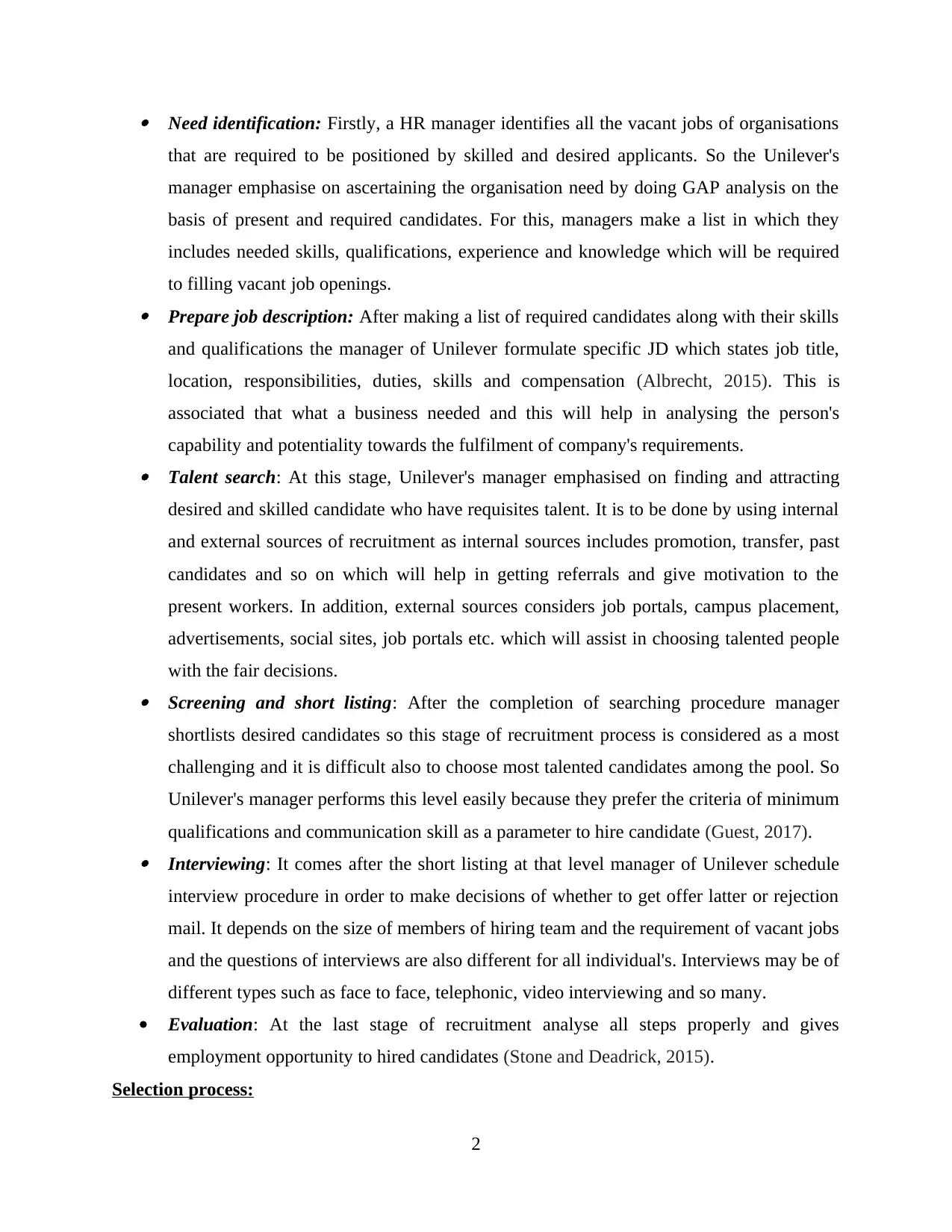
Need identification: Firstly, a HR manager identifies all the vacant jobs of organisations
that are required to be positioned by skilled and desired applicants. So the Unilever's
manager emphasise on ascertaining the organisation need by doing GAP analysis on the
basis of present and required candidates. For this, managers make a list in which they
includes needed skills, qualifications, experience and knowledge which will be required
to filling vacant job openings. Prepare job description: After making a list of required candidates along with their skills
and qualifications the manager of Unilever formulate specific JD which states job title,
location, responsibilities, duties, skills and compensation (Albrecht, 2015). This is
associated that what a business needed and this will help in analysing the person's
capability and potentiality towards the fulfilment of company's requirements. Talent search: At this stage, Unilever's manager emphasised on finding and attracting
desired and skilled candidate who have requisites talent. It is to be done by using internal
and external sources of recruitment as internal sources includes promotion, transfer, past
candidates and so on which will help in getting referrals and give motivation to the
present workers. In addition, external sources considers job portals, campus placement,
advertisements, social sites, job portals etc. which will assist in choosing talented people
with the fair decisions. Screening and short listing: After the completion of searching procedure manager
shortlists desired candidates so this stage of recruitment process is considered as a most
challenging and it is difficult also to choose most talented candidates among the pool. So
Unilever's manager performs this level easily because they prefer the criteria of minimum
qualifications and communication skill as a parameter to hire candidate (Guest, 2017). Interviewing: It comes after the short listing at that level manager of Unilever schedule
interview procedure in order to make decisions of whether to get offer latter or rejection
mail. It depends on the size of members of hiring team and the requirement of vacant jobs
and the questions of interviews are also different for all individual's. Interviews may be of
different types such as face to face, telephonic, video interviewing and so many.
Evaluation: At the last stage of recruitment analyse all steps properly and gives
employment opportunity to hired candidates (Stone and Deadrick, 2015).
Selection process:
2
that are required to be positioned by skilled and desired applicants. So the Unilever's
manager emphasise on ascertaining the organisation need by doing GAP analysis on the
basis of present and required candidates. For this, managers make a list in which they
includes needed skills, qualifications, experience and knowledge which will be required
to filling vacant job openings. Prepare job description: After making a list of required candidates along with their skills
and qualifications the manager of Unilever formulate specific JD which states job title,
location, responsibilities, duties, skills and compensation (Albrecht, 2015). This is
associated that what a business needed and this will help in analysing the person's
capability and potentiality towards the fulfilment of company's requirements. Talent search: At this stage, Unilever's manager emphasised on finding and attracting
desired and skilled candidate who have requisites talent. It is to be done by using internal
and external sources of recruitment as internal sources includes promotion, transfer, past
candidates and so on which will help in getting referrals and give motivation to the
present workers. In addition, external sources considers job portals, campus placement,
advertisements, social sites, job portals etc. which will assist in choosing talented people
with the fair decisions. Screening and short listing: After the completion of searching procedure manager
shortlists desired candidates so this stage of recruitment process is considered as a most
challenging and it is difficult also to choose most talented candidates among the pool. So
Unilever's manager performs this level easily because they prefer the criteria of minimum
qualifications and communication skill as a parameter to hire candidate (Guest, 2017). Interviewing: It comes after the short listing at that level manager of Unilever schedule
interview procedure in order to make decisions of whether to get offer latter or rejection
mail. It depends on the size of members of hiring team and the requirement of vacant jobs
and the questions of interviews are also different for all individual's. Interviews may be of
different types such as face to face, telephonic, video interviewing and so many.
Evaluation: At the last stage of recruitment analyse all steps properly and gives
employment opportunity to hired candidates (Stone and Deadrick, 2015).
Selection process:
2
Paraphrase This Document
Need a fresh take? Get an instant paraphrase of this document with our AI Paraphraser
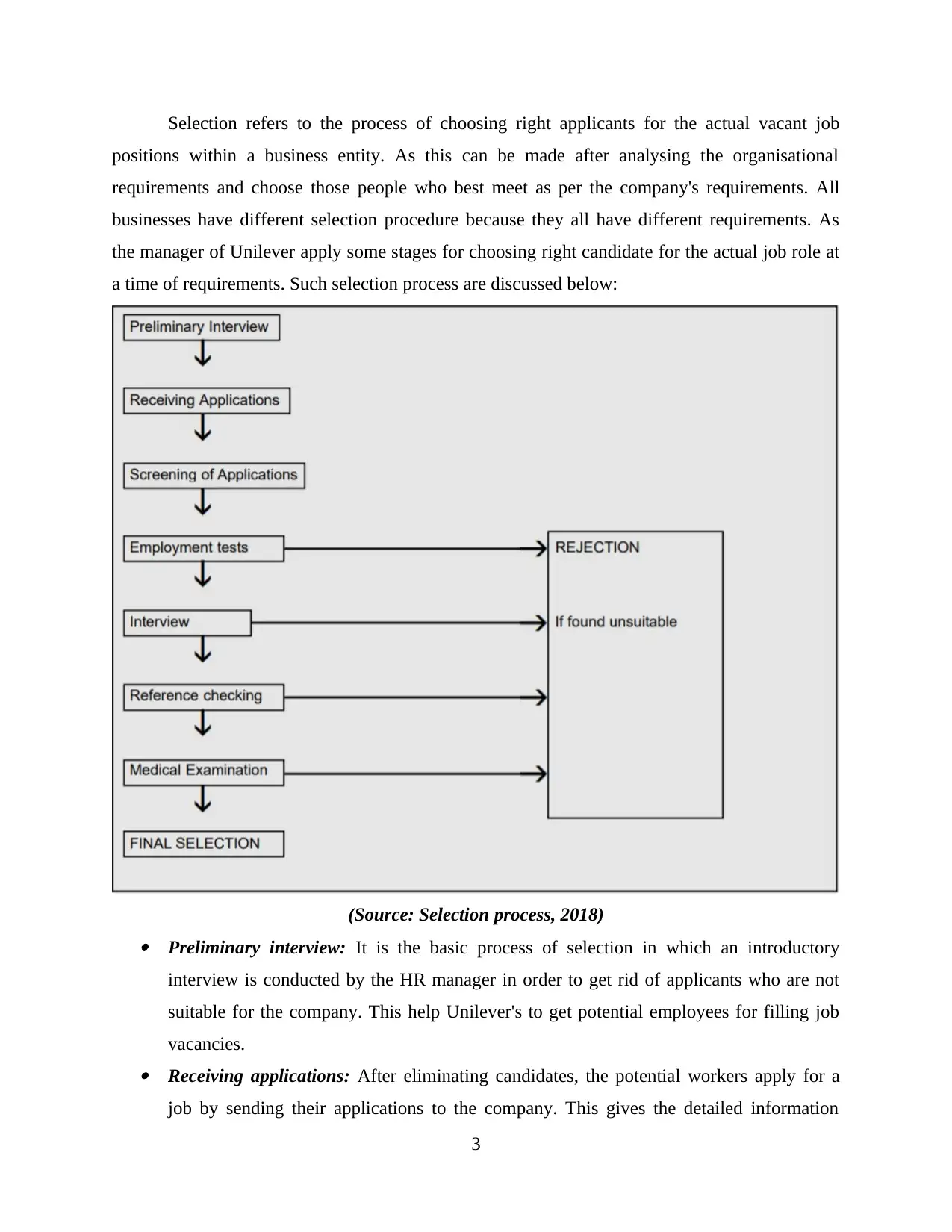
Selection refers to the process of choosing right applicants for the actual vacant job
positions within a business entity. As this can be made after analysing the organisational
requirements and choose those people who best meet as per the company's requirements. All
businesses have different selection procedure because they all have different requirements. As
the manager of Unilever apply some stages for choosing right candidate for the actual job role at
a time of requirements. Such selection process are discussed below:
(Source: Selection process, 2018) Preliminary interview: It is the basic process of selection in which an introductory
interview is conducted by the HR manager in order to get rid of applicants who are not
suitable for the company. This help Unilever's to get potential employees for filling job
vacancies. Receiving applications: After eliminating candidates, the potential workers apply for a
job by sending their applications to the company. This gives the detailed information
3
positions within a business entity. As this can be made after analysing the organisational
requirements and choose those people who best meet as per the company's requirements. All
businesses have different selection procedure because they all have different requirements. As
the manager of Unilever apply some stages for choosing right candidate for the actual job role at
a time of requirements. Such selection process are discussed below:
(Source: Selection process, 2018) Preliminary interview: It is the basic process of selection in which an introductory
interview is conducted by the HR manager in order to get rid of applicants who are not
suitable for the company. This help Unilever's to get potential employees for filling job
vacancies. Receiving applications: After eliminating candidates, the potential workers apply for a
job by sending their applications to the company. This gives the detailed information
3
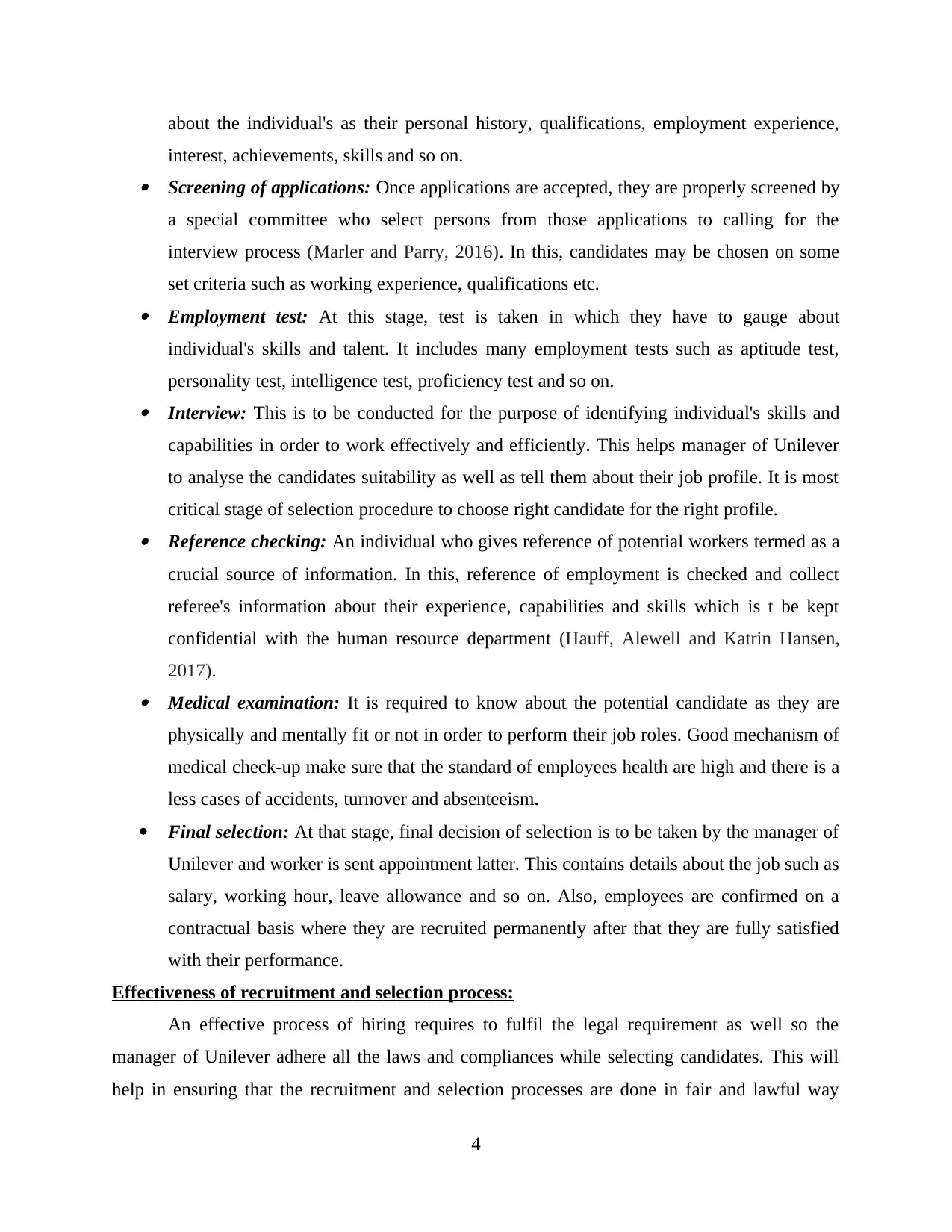
about the individual's as their personal history, qualifications, employment experience,
interest, achievements, skills and so on. Screening of applications: Once applications are accepted, they are properly screened by
a special committee who select persons from those applications to calling for the
interview process (Marler and Parry, 2016). In this, candidates may be chosen on some
set criteria such as working experience, qualifications etc. Employment test: At this stage, test is taken in which they have to gauge about
individual's skills and talent. It includes many employment tests such as aptitude test,
personality test, intelligence test, proficiency test and so on. Interview: This is to be conducted for the purpose of identifying individual's skills and
capabilities in order to work effectively and efficiently. This helps manager of Unilever
to analyse the candidates suitability as well as tell them about their job profile. It is most
critical stage of selection procedure to choose right candidate for the right profile. Reference checking: An individual who gives reference of potential workers termed as a
crucial source of information. In this, reference of employment is checked and collect
referee's information about their experience, capabilities and skills which is t be kept
confidential with the human resource department (Hauff, Alewell and Katrin Hansen,
2017). Medical examination: It is required to know about the potential candidate as they are
physically and mentally fit or not in order to perform their job roles. Good mechanism of
medical check-up make sure that the standard of employees health are high and there is a
less cases of accidents, turnover and absenteeism.
Final selection: At that stage, final decision of selection is to be taken by the manager of
Unilever and worker is sent appointment latter. This contains details about the job such as
salary, working hour, leave allowance and so on. Also, employees are confirmed on a
contractual basis where they are recruited permanently after that they are fully satisfied
with their performance.
Effectiveness of recruitment and selection process:
An effective process of hiring requires to fulfil the legal requirement as well so the
manager of Unilever adhere all the laws and compliances while selecting candidates. This will
help in ensuring that the recruitment and selection processes are done in fair and lawful way
4
interest, achievements, skills and so on. Screening of applications: Once applications are accepted, they are properly screened by
a special committee who select persons from those applications to calling for the
interview process (Marler and Parry, 2016). In this, candidates may be chosen on some
set criteria such as working experience, qualifications etc. Employment test: At this stage, test is taken in which they have to gauge about
individual's skills and talent. It includes many employment tests such as aptitude test,
personality test, intelligence test, proficiency test and so on. Interview: This is to be conducted for the purpose of identifying individual's skills and
capabilities in order to work effectively and efficiently. This helps manager of Unilever
to analyse the candidates suitability as well as tell them about their job profile. It is most
critical stage of selection procedure to choose right candidate for the right profile. Reference checking: An individual who gives reference of potential workers termed as a
crucial source of information. In this, reference of employment is checked and collect
referee's information about their experience, capabilities and skills which is t be kept
confidential with the human resource department (Hauff, Alewell and Katrin Hansen,
2017). Medical examination: It is required to know about the potential candidate as they are
physically and mentally fit or not in order to perform their job roles. Good mechanism of
medical check-up make sure that the standard of employees health are high and there is a
less cases of accidents, turnover and absenteeism.
Final selection: At that stage, final decision of selection is to be taken by the manager of
Unilever and worker is sent appointment latter. This contains details about the job such as
salary, working hour, leave allowance and so on. Also, employees are confirmed on a
contractual basis where they are recruited permanently after that they are fully satisfied
with their performance.
Effectiveness of recruitment and selection process:
An effective process of hiring requires to fulfil the legal requirement as well so the
manager of Unilever adhere all the laws and compliances while selecting candidates. This will
help in ensuring that the recruitment and selection processes are done in fair and lawful way
4
⊘ This is a preview!⊘
Do you want full access?
Subscribe today to unlock all pages.

Trusted by 1+ million students worldwide
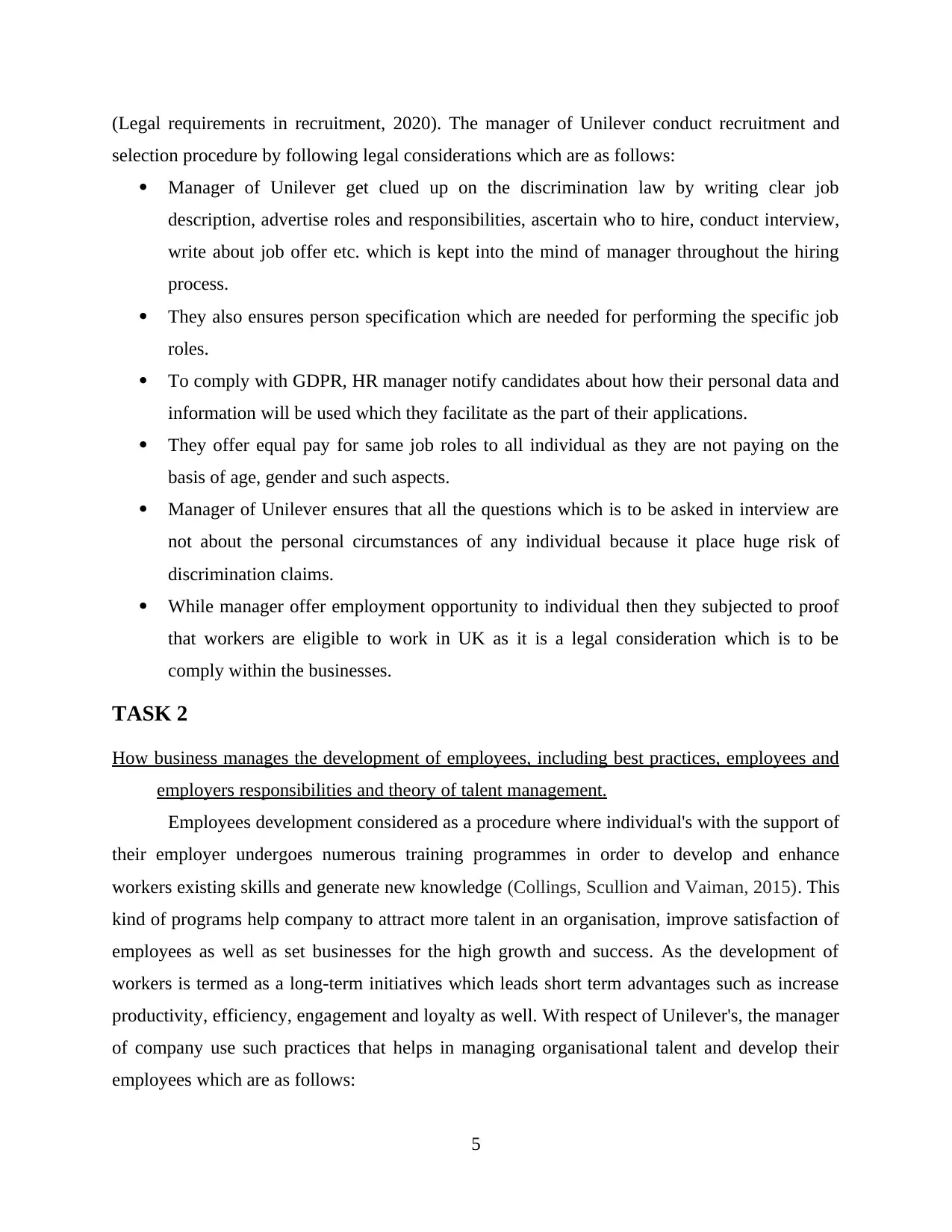
(Legal requirements in recruitment, 2020). The manager of Unilever conduct recruitment and
selection procedure by following legal considerations which are as follows:
Manager of Unilever get clued up on the discrimination law by writing clear job
description, advertise roles and responsibilities, ascertain who to hire, conduct interview,
write about job offer etc. which is kept into the mind of manager throughout the hiring
process.
They also ensures person specification which are needed for performing the specific job
roles.
To comply with GDPR, HR manager notify candidates about how their personal data and
information will be used which they facilitate as the part of their applications.
They offer equal pay for same job roles to all individual as they are not paying on the
basis of age, gender and such aspects.
Manager of Unilever ensures that all the questions which is to be asked in interview are
not about the personal circumstances of any individual because it place huge risk of
discrimination claims.
While manager offer employment opportunity to individual then they subjected to proof
that workers are eligible to work in UK as it is a legal consideration which is to be
comply within the businesses.
TASK 2
How business manages the development of employees, including best practices, employees and
employers responsibilities and theory of talent management.
Employees development considered as a procedure where individual's with the support of
their employer undergoes numerous training programmes in order to develop and enhance
workers existing skills and generate new knowledge (Collings, Scullion and Vaiman, 2015). This
kind of programs help company to attract more talent in an organisation, improve satisfaction of
employees as well as set businesses for the high growth and success. As the development of
workers is termed as a long-term initiatives which leads short term advantages such as increase
productivity, efficiency, engagement and loyalty as well. With respect of Unilever's, the manager
of company use such practices that helps in managing organisational talent and develop their
employees which are as follows:
5
selection procedure by following legal considerations which are as follows:
Manager of Unilever get clued up on the discrimination law by writing clear job
description, advertise roles and responsibilities, ascertain who to hire, conduct interview,
write about job offer etc. which is kept into the mind of manager throughout the hiring
process.
They also ensures person specification which are needed for performing the specific job
roles.
To comply with GDPR, HR manager notify candidates about how their personal data and
information will be used which they facilitate as the part of their applications.
They offer equal pay for same job roles to all individual as they are not paying on the
basis of age, gender and such aspects.
Manager of Unilever ensures that all the questions which is to be asked in interview are
not about the personal circumstances of any individual because it place huge risk of
discrimination claims.
While manager offer employment opportunity to individual then they subjected to proof
that workers are eligible to work in UK as it is a legal consideration which is to be
comply within the businesses.
TASK 2
How business manages the development of employees, including best practices, employees and
employers responsibilities and theory of talent management.
Employees development considered as a procedure where individual's with the support of
their employer undergoes numerous training programmes in order to develop and enhance
workers existing skills and generate new knowledge (Collings, Scullion and Vaiman, 2015). This
kind of programs help company to attract more talent in an organisation, improve satisfaction of
employees as well as set businesses for the high growth and success. As the development of
workers is termed as a long-term initiatives which leads short term advantages such as increase
productivity, efficiency, engagement and loyalty as well. With respect of Unilever's, the manager
of company use such practices that helps in managing organisational talent and develop their
employees which are as follows:
5
Paraphrase This Document
Need a fresh take? Get an instant paraphrase of this document with our AI Paraphraser
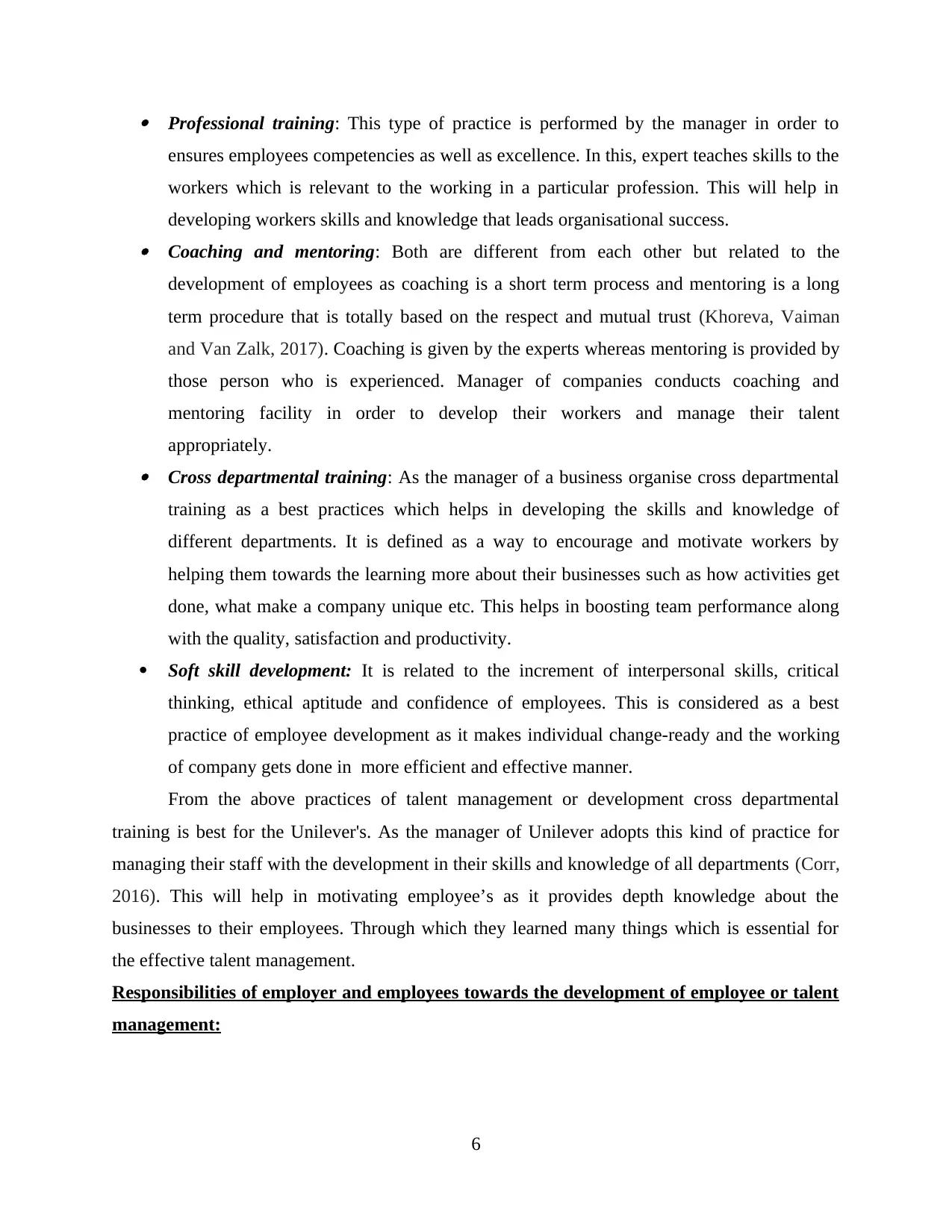
Professional training: This type of practice is performed by the manager in order to
ensures employees competencies as well as excellence. In this, expert teaches skills to the
workers which is relevant to the working in a particular profession. This will help in
developing workers skills and knowledge that leads organisational success. Coaching and mentoring: Both are different from each other but related to the
development of employees as coaching is a short term process and mentoring is a long
term procedure that is totally based on the respect and mutual trust (Khoreva, Vaiman
and Van Zalk, 2017). Coaching is given by the experts whereas mentoring is provided by
those person who is experienced. Manager of companies conducts coaching and
mentoring facility in order to develop their workers and manage their talent
appropriately. Cross departmental training: As the manager of a business organise cross departmental
training as a best practices which helps in developing the skills and knowledge of
different departments. It is defined as a way to encourage and motivate workers by
helping them towards the learning more about their businesses such as how activities get
done, what make a company unique etc. This helps in boosting team performance along
with the quality, satisfaction and productivity.
Soft skill development: It is related to the increment of interpersonal skills, critical
thinking, ethical aptitude and confidence of employees. This is considered as a best
practice of employee development as it makes individual change-ready and the working
of company gets done in more efficient and effective manner.
From the above practices of talent management or development cross departmental
training is best for the Unilever's. As the manager of Unilever adopts this kind of practice for
managing their staff with the development in their skills and knowledge of all departments (Corr,
2016). This will help in motivating employee’s as it provides depth knowledge about the
businesses to their employees. Through which they learned many things which is essential for
the effective talent management.
Responsibilities of employer and employees towards the development of employee or talent
management:
6
ensures employees competencies as well as excellence. In this, expert teaches skills to the
workers which is relevant to the working in a particular profession. This will help in
developing workers skills and knowledge that leads organisational success. Coaching and mentoring: Both are different from each other but related to the
development of employees as coaching is a short term process and mentoring is a long
term procedure that is totally based on the respect and mutual trust (Khoreva, Vaiman
and Van Zalk, 2017). Coaching is given by the experts whereas mentoring is provided by
those person who is experienced. Manager of companies conducts coaching and
mentoring facility in order to develop their workers and manage their talent
appropriately. Cross departmental training: As the manager of a business organise cross departmental
training as a best practices which helps in developing the skills and knowledge of
different departments. It is defined as a way to encourage and motivate workers by
helping them towards the learning more about their businesses such as how activities get
done, what make a company unique etc. This helps in boosting team performance along
with the quality, satisfaction and productivity.
Soft skill development: It is related to the increment of interpersonal skills, critical
thinking, ethical aptitude and confidence of employees. This is considered as a best
practice of employee development as it makes individual change-ready and the working
of company gets done in more efficient and effective manner.
From the above practices of talent management or development cross departmental
training is best for the Unilever's. As the manager of Unilever adopts this kind of practice for
managing their staff with the development in their skills and knowledge of all departments (Corr,
2016). This will help in motivating employee’s as it provides depth knowledge about the
businesses to their employees. Through which they learned many things which is essential for
the effective talent management.
Responsibilities of employer and employees towards the development of employee or talent
management:
6
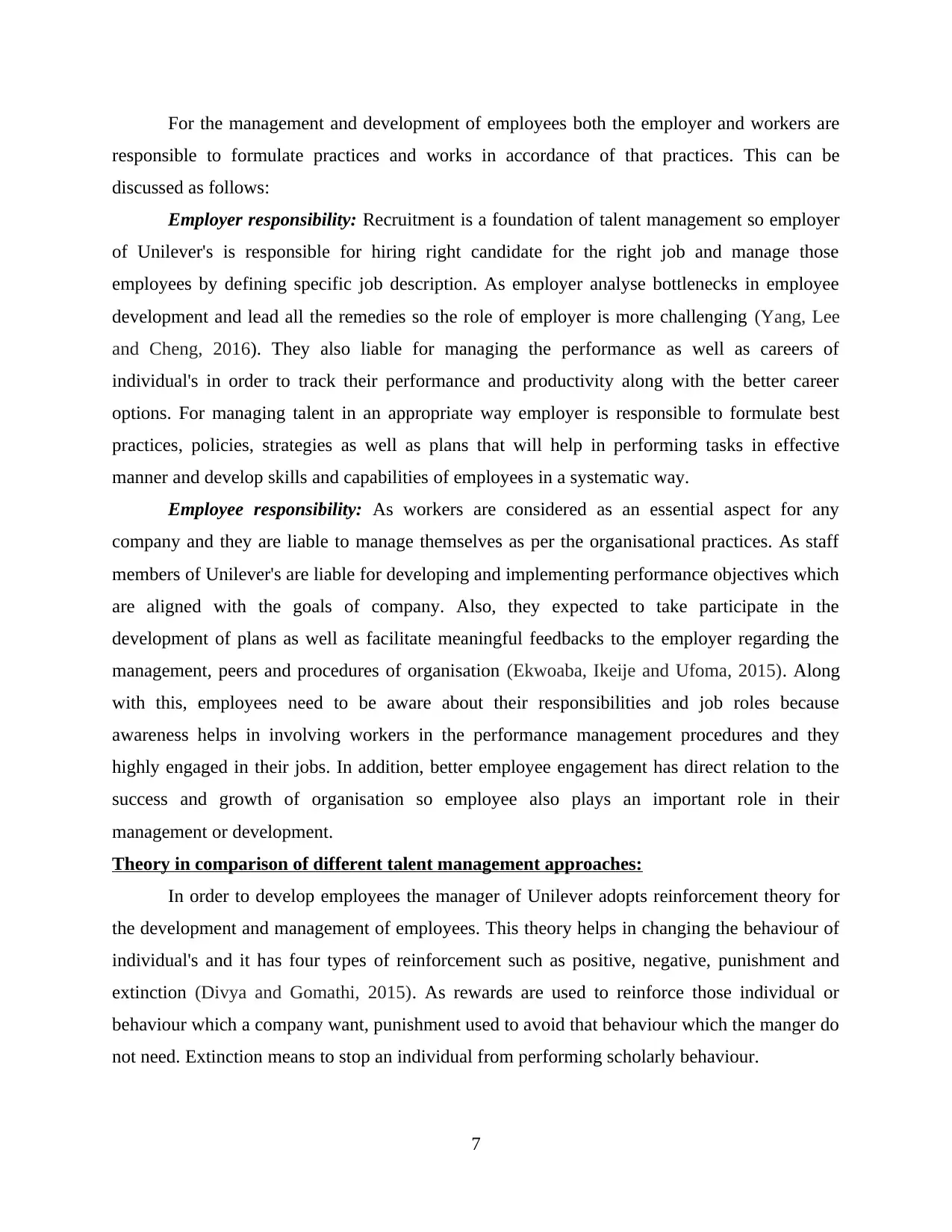
For the management and development of employees both the employer and workers are
responsible to formulate practices and works in accordance of that practices. This can be
discussed as follows:
Employer responsibility: Recruitment is a foundation of talent management so employer
of Unilever's is responsible for hiring right candidate for the right job and manage those
employees by defining specific job description. As employer analyse bottlenecks in employee
development and lead all the remedies so the role of employer is more challenging (Yang, Lee
and Cheng, 2016). They also liable for managing the performance as well as careers of
individual's in order to track their performance and productivity along with the better career
options. For managing talent in an appropriate way employer is responsible to formulate best
practices, policies, strategies as well as plans that will help in performing tasks in effective
manner and develop skills and capabilities of employees in a systematic way.
Employee responsibility: As workers are considered as an essential aspect for any
company and they are liable to manage themselves as per the organisational practices. As staff
members of Unilever's are liable for developing and implementing performance objectives which
are aligned with the goals of company. Also, they expected to take participate in the
development of plans as well as facilitate meaningful feedbacks to the employer regarding the
management, peers and procedures of organisation (Ekwoaba, Ikeije and Ufoma, 2015). Along
with this, employees need to be aware about their responsibilities and job roles because
awareness helps in involving workers in the performance management procedures and they
highly engaged in their jobs. In addition, better employee engagement has direct relation to the
success and growth of organisation so employee also plays an important role in their
management or development.
Theory in comparison of different talent management approaches:
In order to develop employees the manager of Unilever adopts reinforcement theory for
the development and management of employees. This theory helps in changing the behaviour of
individual's and it has four types of reinforcement such as positive, negative, punishment and
extinction (Divya and Gomathi, 2015). As rewards are used to reinforce those individual or
behaviour which a company want, punishment used to avoid that behaviour which the manger do
not need. Extinction means to stop an individual from performing scholarly behaviour.
7
responsible to formulate practices and works in accordance of that practices. This can be
discussed as follows:
Employer responsibility: Recruitment is a foundation of talent management so employer
of Unilever's is responsible for hiring right candidate for the right job and manage those
employees by defining specific job description. As employer analyse bottlenecks in employee
development and lead all the remedies so the role of employer is more challenging (Yang, Lee
and Cheng, 2016). They also liable for managing the performance as well as careers of
individual's in order to track their performance and productivity along with the better career
options. For managing talent in an appropriate way employer is responsible to formulate best
practices, policies, strategies as well as plans that will help in performing tasks in effective
manner and develop skills and capabilities of employees in a systematic way.
Employee responsibility: As workers are considered as an essential aspect for any
company and they are liable to manage themselves as per the organisational practices. As staff
members of Unilever's are liable for developing and implementing performance objectives which
are aligned with the goals of company. Also, they expected to take participate in the
development of plans as well as facilitate meaningful feedbacks to the employer regarding the
management, peers and procedures of organisation (Ekwoaba, Ikeije and Ufoma, 2015). Along
with this, employees need to be aware about their responsibilities and job roles because
awareness helps in involving workers in the performance management procedures and they
highly engaged in their jobs. In addition, better employee engagement has direct relation to the
success and growth of organisation so employee also plays an important role in their
management or development.
Theory in comparison of different talent management approaches:
In order to develop employees the manager of Unilever adopts reinforcement theory for
the development and management of employees. This theory helps in changing the behaviour of
individual's and it has four types of reinforcement such as positive, negative, punishment and
extinction (Divya and Gomathi, 2015). As rewards are used to reinforce those individual or
behaviour which a company want, punishment used to avoid that behaviour which the manger do
not need. Extinction means to stop an individual from performing scholarly behaviour.
7
⊘ This is a preview!⊘
Do you want full access?
Subscribe today to unlock all pages.

Trusted by 1+ million students worldwide
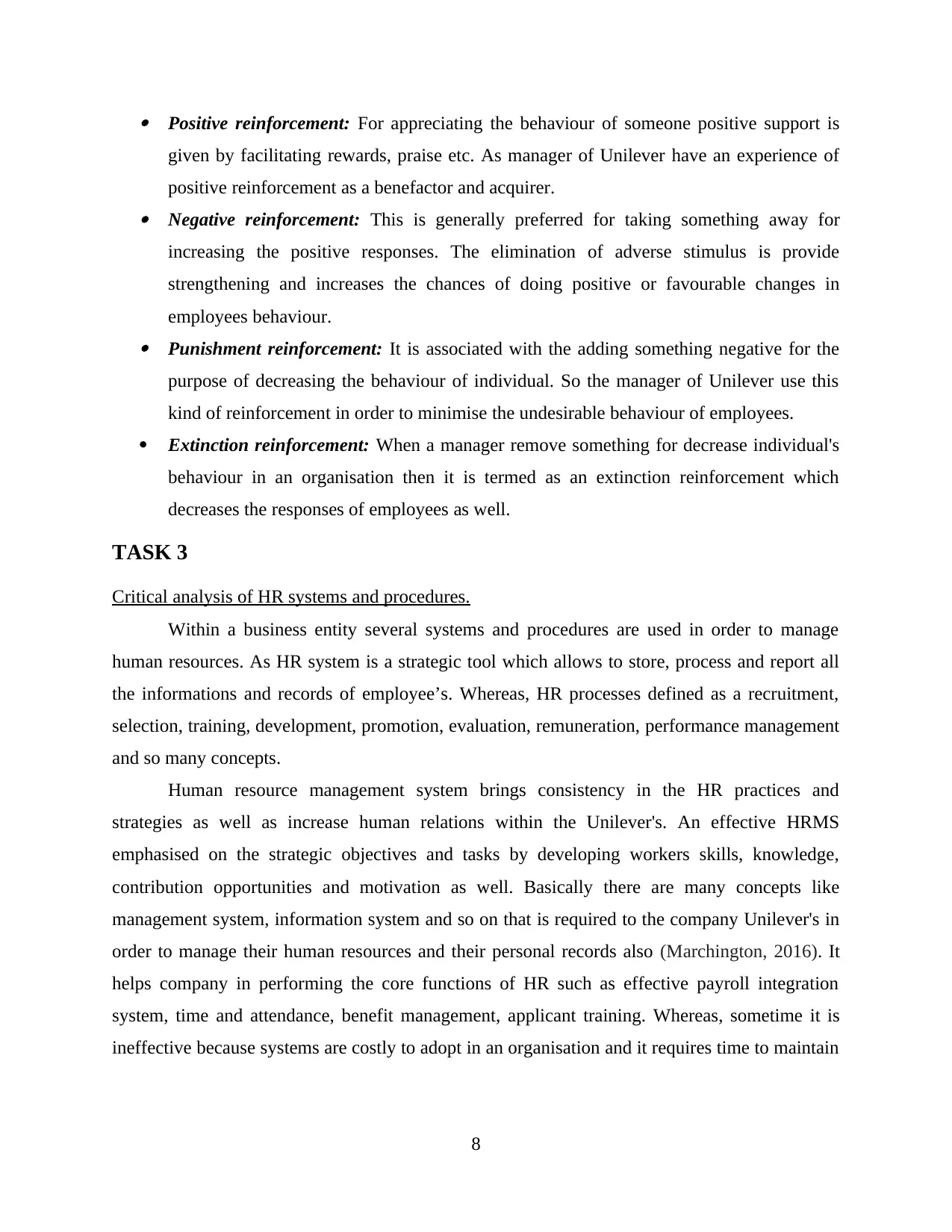
Positive reinforcement: For appreciating the behaviour of someone positive support is
given by facilitating rewards, praise etc. As manager of Unilever have an experience of
positive reinforcement as a benefactor and acquirer. Negative reinforcement: This is generally preferred for taking something away for
increasing the positive responses. The elimination of adverse stimulus is provide
strengthening and increases the chances of doing positive or favourable changes in
employees behaviour. Punishment reinforcement: It is associated with the adding something negative for the
purpose of decreasing the behaviour of individual. So the manager of Unilever use this
kind of reinforcement in order to minimise the undesirable behaviour of employees.
Extinction reinforcement: When a manager remove something for decrease individual's
behaviour in an organisation then it is termed as an extinction reinforcement which
decreases the responses of employees as well.
TASK 3
Critical analysis of HR systems and procedures.
Within a business entity several systems and procedures are used in order to manage
human resources. As HR system is a strategic tool which allows to store, process and report all
the informations and records of employee’s. Whereas, HR processes defined as a recruitment,
selection, training, development, promotion, evaluation, remuneration, performance management
and so many concepts.
Human resource management system brings consistency in the HR practices and
strategies as well as increase human relations within the Unilever's. An effective HRMS
emphasised on the strategic objectives and tasks by developing workers skills, knowledge,
contribution opportunities and motivation as well. Basically there are many concepts like
management system, information system and so on that is required to the company Unilever's in
order to manage their human resources and their personal records also (Marchington, 2016). It
helps company in performing the core functions of HR such as effective payroll integration
system, time and attendance, benefit management, applicant training. Whereas, sometime it is
ineffective because systems are costly to adopt in an organisation and it requires time to maintain
8
given by facilitating rewards, praise etc. As manager of Unilever have an experience of
positive reinforcement as a benefactor and acquirer. Negative reinforcement: This is generally preferred for taking something away for
increasing the positive responses. The elimination of adverse stimulus is provide
strengthening and increases the chances of doing positive or favourable changes in
employees behaviour. Punishment reinforcement: It is associated with the adding something negative for the
purpose of decreasing the behaviour of individual. So the manager of Unilever use this
kind of reinforcement in order to minimise the undesirable behaviour of employees.
Extinction reinforcement: When a manager remove something for decrease individual's
behaviour in an organisation then it is termed as an extinction reinforcement which
decreases the responses of employees as well.
TASK 3
Critical analysis of HR systems and procedures.
Within a business entity several systems and procedures are used in order to manage
human resources. As HR system is a strategic tool which allows to store, process and report all
the informations and records of employee’s. Whereas, HR processes defined as a recruitment,
selection, training, development, promotion, evaluation, remuneration, performance management
and so many concepts.
Human resource management system brings consistency in the HR practices and
strategies as well as increase human relations within the Unilever's. An effective HRMS
emphasised on the strategic objectives and tasks by developing workers skills, knowledge,
contribution opportunities and motivation as well. Basically there are many concepts like
management system, information system and so on that is required to the company Unilever's in
order to manage their human resources and their personal records also (Marchington, 2016). It
helps company in performing the core functions of HR such as effective payroll integration
system, time and attendance, benefit management, applicant training. Whereas, sometime it is
ineffective because systems are costly to adopt in an organisation and it requires time to maintain
8
Paraphrase This Document
Need a fresh take? Get an instant paraphrase of this document with our AI Paraphraser
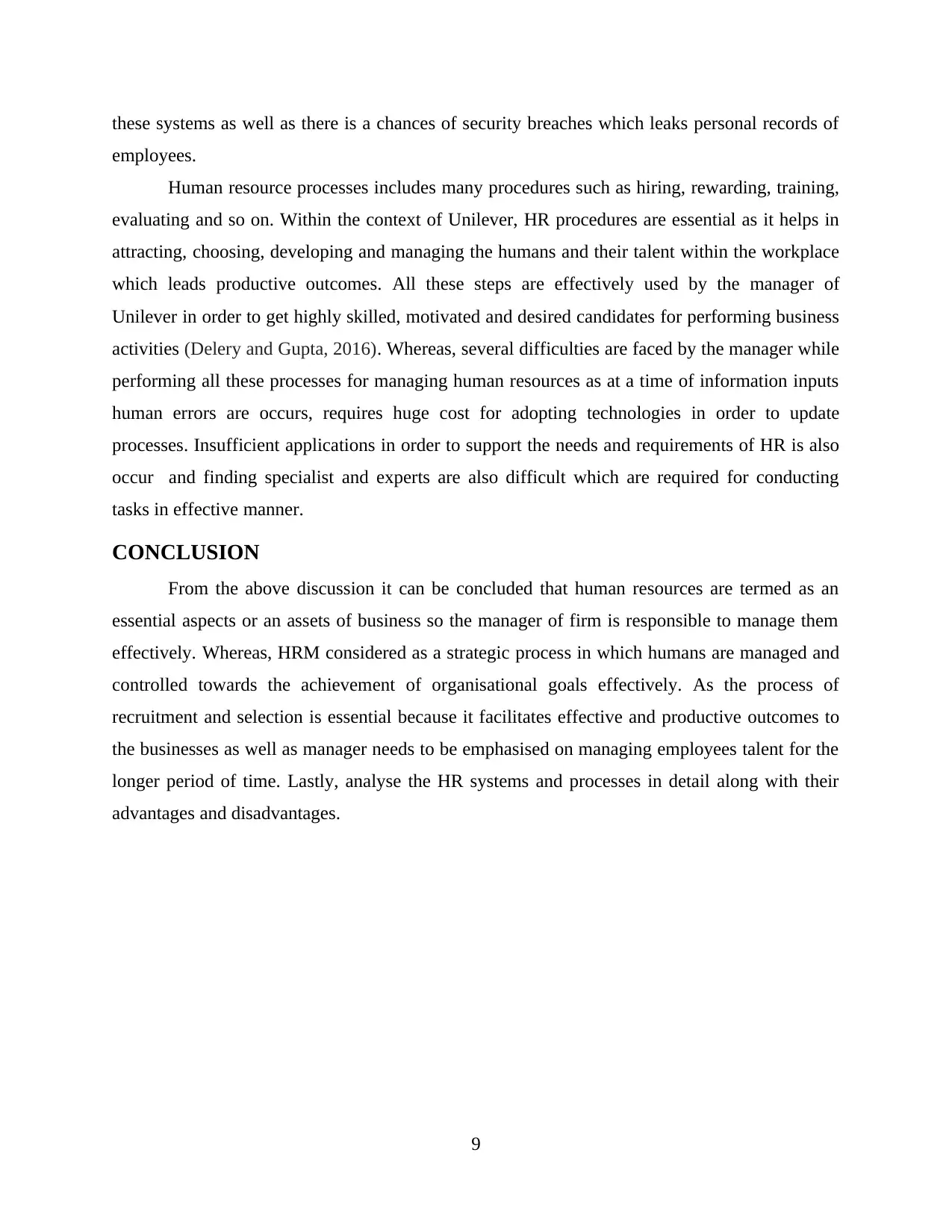
these systems as well as there is a chances of security breaches which leaks personal records of
employees.
Human resource processes includes many procedures such as hiring, rewarding, training,
evaluating and so on. Within the context of Unilever, HR procedures are essential as it helps in
attracting, choosing, developing and managing the humans and their talent within the workplace
which leads productive outcomes. All these steps are effectively used by the manager of
Unilever in order to get highly skilled, motivated and desired candidates for performing business
activities (Delery and Gupta, 2016). Whereas, several difficulties are faced by the manager while
performing all these processes for managing human resources as at a time of information inputs
human errors are occurs, requires huge cost for adopting technologies in order to update
processes. Insufficient applications in order to support the needs and requirements of HR is also
occur and finding specialist and experts are also difficult which are required for conducting
tasks in effective manner.
CONCLUSION
From the above discussion it can be concluded that human resources are termed as an
essential aspects or an assets of business so the manager of firm is responsible to manage them
effectively. Whereas, HRM considered as a strategic process in which humans are managed and
controlled towards the achievement of organisational goals effectively. As the process of
recruitment and selection is essential because it facilitates effective and productive outcomes to
the businesses as well as manager needs to be emphasised on managing employees talent for the
longer period of time. Lastly, analyse the HR systems and processes in detail along with their
advantages and disadvantages.
9
employees.
Human resource processes includes many procedures such as hiring, rewarding, training,
evaluating and so on. Within the context of Unilever, HR procedures are essential as it helps in
attracting, choosing, developing and managing the humans and their talent within the workplace
which leads productive outcomes. All these steps are effectively used by the manager of
Unilever in order to get highly skilled, motivated and desired candidates for performing business
activities (Delery and Gupta, 2016). Whereas, several difficulties are faced by the manager while
performing all these processes for managing human resources as at a time of information inputs
human errors are occurs, requires huge cost for adopting technologies in order to update
processes. Insufficient applications in order to support the needs and requirements of HR is also
occur and finding specialist and experts are also difficult which are required for conducting
tasks in effective manner.
CONCLUSION
From the above discussion it can be concluded that human resources are termed as an
essential aspects or an assets of business so the manager of firm is responsible to manage them
effectively. Whereas, HRM considered as a strategic process in which humans are managed and
controlled towards the achievement of organisational goals effectively. As the process of
recruitment and selection is essential because it facilitates effective and productive outcomes to
the businesses as well as manager needs to be emphasised on managing employees talent for the
longer period of time. Lastly, analyse the HR systems and processes in detail along with their
advantages and disadvantages.
9
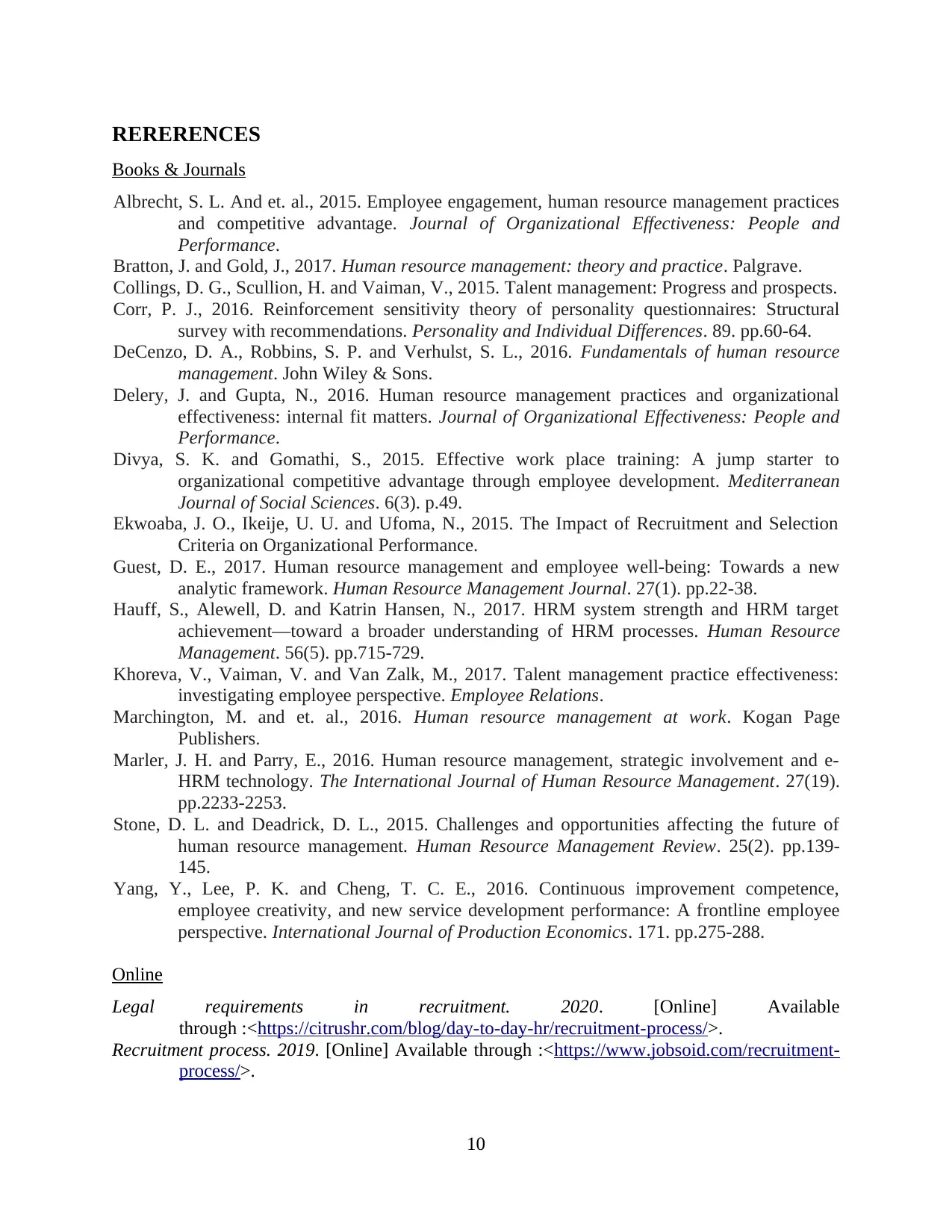
RERERENCES
Books & Journals
Albrecht, S. L. And et. al., 2015. Employee engagement, human resource management practices
and competitive advantage. Journal of Organizational Effectiveness: People and
Performance.
Bratton, J. and Gold, J., 2017. Human resource management: theory and practice. Palgrave.
Collings, D. G., Scullion, H. and Vaiman, V., 2015. Talent management: Progress and prospects.
Corr, P. J., 2016. Reinforcement sensitivity theory of personality questionnaires: Structural
survey with recommendations. Personality and Individual Differences. 89. pp.60-64.
DeCenzo, D. A., Robbins, S. P. and Verhulst, S. L., 2016. Fundamentals of human resource
management. John Wiley & Sons.
Delery, J. and Gupta, N., 2016. Human resource management practices and organizational
effectiveness: internal fit matters. Journal of Organizational Effectiveness: People and
Performance.
Divya, S. K. and Gomathi, S., 2015. Effective work place training: A jump starter to
organizational competitive advantage through employee development. Mediterranean
Journal of Social Sciences. 6(3). p.49.
Ekwoaba, J. O., Ikeije, U. U. and Ufoma, N., 2015. The Impact of Recruitment and Selection
Criteria on Organizational Performance.
Guest, D. E., 2017. Human resource management and employee well‐being: Towards a new
analytic framework. Human Resource Management Journal. 27(1). pp.22-38.
Hauff, S., Alewell, D. and Katrin Hansen, N., 2017. HRM system strength and HRM target
achievement—toward a broader understanding of HRM processes. Human Resource
Management. 56(5). pp.715-729.
Khoreva, V., Vaiman, V. and Van Zalk, M., 2017. Talent management practice effectiveness:
investigating employee perspective. Employee Relations.
Marchington, M. and et. al., 2016. Human resource management at work. Kogan Page
Publishers.
Marler, J. H. and Parry, E., 2016. Human resource management, strategic involvement and e-
HRM technology. The International Journal of Human Resource Management. 27(19).
pp.2233-2253.
Stone, D. L. and Deadrick, D. L., 2015. Challenges and opportunities affecting the future of
human resource management. Human Resource Management Review. 25(2). pp.139-
145.
Yang, Y., Lee, P. K. and Cheng, T. C. E., 2016. Continuous improvement competence,
employee creativity, and new service development performance: A frontline employee
perspective. International Journal of Production Economics. 171. pp.275-288.
Online
Legal requirements in recruitment. 2020. [Online] Available
through :<https://citrushr.com/blog/day-to-day-hr/recruitment-process/>.
Recruitment process. 2019. [Online] Available through :<https://www.jobsoid.com/recruitment-
process/>.
10
Books & Journals
Albrecht, S. L. And et. al., 2015. Employee engagement, human resource management practices
and competitive advantage. Journal of Organizational Effectiveness: People and
Performance.
Bratton, J. and Gold, J., 2017. Human resource management: theory and practice. Palgrave.
Collings, D. G., Scullion, H. and Vaiman, V., 2015. Talent management: Progress and prospects.
Corr, P. J., 2016. Reinforcement sensitivity theory of personality questionnaires: Structural
survey with recommendations. Personality and Individual Differences. 89. pp.60-64.
DeCenzo, D. A., Robbins, S. P. and Verhulst, S. L., 2016. Fundamentals of human resource
management. John Wiley & Sons.
Delery, J. and Gupta, N., 2016. Human resource management practices and organizational
effectiveness: internal fit matters. Journal of Organizational Effectiveness: People and
Performance.
Divya, S. K. and Gomathi, S., 2015. Effective work place training: A jump starter to
organizational competitive advantage through employee development. Mediterranean
Journal of Social Sciences. 6(3). p.49.
Ekwoaba, J. O., Ikeije, U. U. and Ufoma, N., 2015. The Impact of Recruitment and Selection
Criteria on Organizational Performance.
Guest, D. E., 2017. Human resource management and employee well‐being: Towards a new
analytic framework. Human Resource Management Journal. 27(1). pp.22-38.
Hauff, S., Alewell, D. and Katrin Hansen, N., 2017. HRM system strength and HRM target
achievement—toward a broader understanding of HRM processes. Human Resource
Management. 56(5). pp.715-729.
Khoreva, V., Vaiman, V. and Van Zalk, M., 2017. Talent management practice effectiveness:
investigating employee perspective. Employee Relations.
Marchington, M. and et. al., 2016. Human resource management at work. Kogan Page
Publishers.
Marler, J. H. and Parry, E., 2016. Human resource management, strategic involvement and e-
HRM technology. The International Journal of Human Resource Management. 27(19).
pp.2233-2253.
Stone, D. L. and Deadrick, D. L., 2015. Challenges and opportunities affecting the future of
human resource management. Human Resource Management Review. 25(2). pp.139-
145.
Yang, Y., Lee, P. K. and Cheng, T. C. E., 2016. Continuous improvement competence,
employee creativity, and new service development performance: A frontline employee
perspective. International Journal of Production Economics. 171. pp.275-288.
Online
Legal requirements in recruitment. 2020. [Online] Available
through :<https://citrushr.com/blog/day-to-day-hr/recruitment-process/>.
Recruitment process. 2019. [Online] Available through :<https://www.jobsoid.com/recruitment-
process/>.
10
⊘ This is a preview!⊘
Do you want full access?
Subscribe today to unlock all pages.

Trusted by 1+ million students worldwide
1 out of 12
Related Documents
Your All-in-One AI-Powered Toolkit for Academic Success.
+13062052269
info@desklib.com
Available 24*7 on WhatsApp / Email
![[object Object]](/_next/static/media/star-bottom.7253800d.svg)
Unlock your academic potential
Copyright © 2020–2026 A2Z Services. All Rights Reserved. Developed and managed by ZUCOL.





